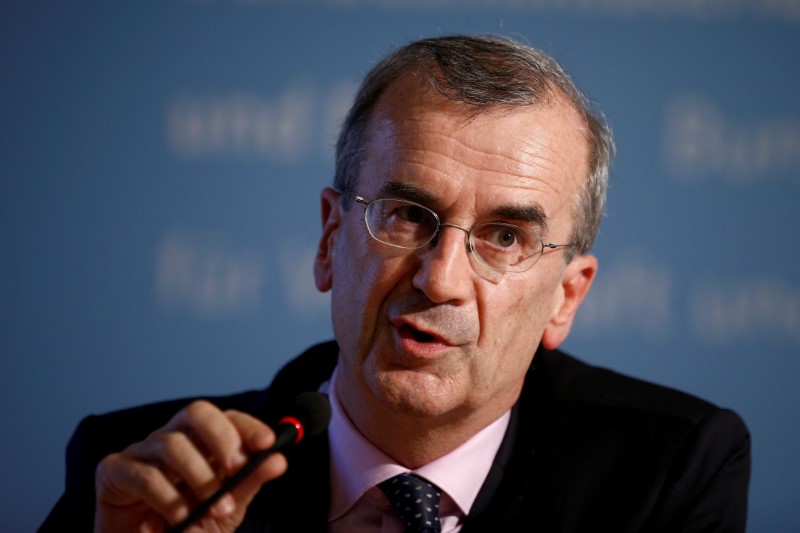 © Reuters. FILE PHOTO — Governor of the Bank of France de Galhau attends a press conference after the Franco-German Financial Council meeting in Berlin
© Reuters. FILE PHOTO — Governor of the Bank of France de Galhau attends a press conference after the Franco-German Financial Council meeting in BerlinPARIS (Reuters) – There is no need to worry about a slowdown in the pace of the European Central Bank’s asset purchases as it keeps monetary policy accommodative overall, French central bank chief Francois Villeroy de Galhau said on Sunday.
Despite firming economic growth in the euro zone, the ECB has only gradually moved toward reducing its exceptionally loose monetary policy as inflation has remained below its target of just under 2 percent.
“No-one should fear a further reduction in the intensity of our monthly net asset purchases, and their possible end thereafter, insofar as we will maintain a very accommodative monetary policy — to be judged on all its instruments,” Villeroy said in an interview with French daily Le Figaro.
With asset buys due to expire at the end of the year, policymakers are set to decide on Oct. 26 whether to prolong stimulus. They must reconcile the bloc’s best growth run in a decade with an inflation rate that is projected to undershoot the ECB’s target for years more.
“The spirit could be, given the progress that has been achieved, an appropriate reduction in net monthly asset purchases, while maintaining a high stock of ECB-held assets, and a very accommodative monetary policy with the whole of the instruments at our disposal,” Villeroy said.
Five people with direct knowledge of the discussion told Reuters last week that ECB policymakers broadly agreed on extending purchases at a lower volume, with views converging on a nine-month extension.
Separately, Villeroy also expressed concern about the level of debt in France, particularly that of companies.
“In Europe, public debt must be tightened, particularly in France. We also have to worry about the rapid growth in household debts, especially those of large companies, up almost 8 percent,” he said.
The High Council for Financial Stability, chaired by the finance minister with an active role for the Bank of France, was due to release a precise diagnosis of the situation by the end of the year.
“If needed, we will take macroprudential measures,” Villeroy said.
“The recovery in investment is very encouraging. But there is also a strong rebound in corporate acquisitions, financed by debt: this is one of the points to watch for.”
Fusion Media or anyone involved with Fusion Media will not accept any liability for loss or damage as a result of reliance on the information including data, quotes, charts and buy/sell signals contained within this website. Please be fully informed regarding the risks and costs associated with trading the financial markets, it is one of the riskiest investment forms possible.
Source: Investing.com



























